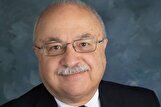
Representatives from Iran and the U.S. are set to hold indirect negotiations in Oman's capital, Muscat, over Iran’s nuclear program.
To know more about the issue we reached out to Nader Entessar, professor emeritus of political science from the University of South Alabama.
Here is the text of the interview:
The dialogue between Iran and the United States will begin on Saturday in Oman. What is your assessment of the start of these talks?
Both sides have been rather tight-lipped. If President Trump had not mentioned this dialogue in his meeting with the Israeli Prime Minister, Netanyahu, most people would not have known about it. Even Netanyahu was caught off guard, as shown by his facial expression and body language. I believe the preparations for Saturday's dialogue have been made for several weeks. However, the public does not know the specifics and parameters of the meeting in Oman. Therefore, it is difficult to assess how the initial dialogue will proceed.
The U.S. State Department has referred to these discussions as merely a dialogue and not negotiations. It seems Washington aims to conduct an initial assessment of Iran’s response to U.S. demands. What is your view?
I think both Iran and the U.S. have the same approach to this Saturday's Oman meeting. If I may use a boxing metaphor, both Tehran and Washington want to feel each other, as many boxers do, in the early rounds of their match. This will allow the U.S. and Iran to adjust and calibrate their strategy in the middle and late rounds of their political match.
Iran has also emphasized indirect dialogue in these talks. It appears Tehran wants to gauge the scope of U.S. demands to determine whether they are negotiable. If a favorable stance is observed, Iran might move toward direct talks. What is your assessment?
I agree with this assessment. The only specific public demand that Trump has repeatedly made is that Iran will not be allowed to develop nuclear weapons. We don't know what other demands Trump will present. Trump's hard-line militarist National Security Advisor has stated that the U.S. will accept nothing less than total destruction of Iran's nuclear facilities under U.S. supervision, what he has called the "Libyan model." Will this be Trump's final position, or will it be negotiable? In other words, the unknown question is to what extent Trump will follow the advice of extremist hard-liners in the upper echelon of his administration. If Iran determines that the U.S. is flexible and does not make dogmatic, unrealistic, maximalist demands, then the prospects of some form of direct talks between the U.S. and Iran will improve.
The Trump administration’s selection of Steve Witkoff who stresses limiting Iran’s nuclear program rather than dismantling it (the Libya model) — suggests a degree of optimism about the negotiations. What is your evaluation?
The selection of Steve Witkoff, a long-time business confidant and trusted friend of President Trump who has not been a Washington insider, is indicative of Trump's preferred negotiating style. Wikoff also has strong Israeli ties, which may make it problematic for Netanyahu and his U.S. supporters, especially the advocates of the 'Libyan model," to scuttle the talks if they indeed reach a serious stage down the road.
Iranian officials, including the president and foreign minister, have proposed engaging with U.S. companies and encouraging American investment in Iran. How do you think this could impact the negotiations?
Donald Trump fancies himself as a transactional president. So, any offer that allows him to show his skills in this matter will be enticing to him. However, we should be aware of the herculean obstacles that exist on the path of U.S. private business and investments that exist on the path of U.S. business transactions with Iran. From the time of the presidency of Hashemi Rafsanjani to the present time, anytime Iran tried to entice U.S. investments in Iran, Congress created obstacles. Much of the existing laws prohibiting American investments in or doing business with Iran are enshired in a series of laws and regulations that Congress has enacted.